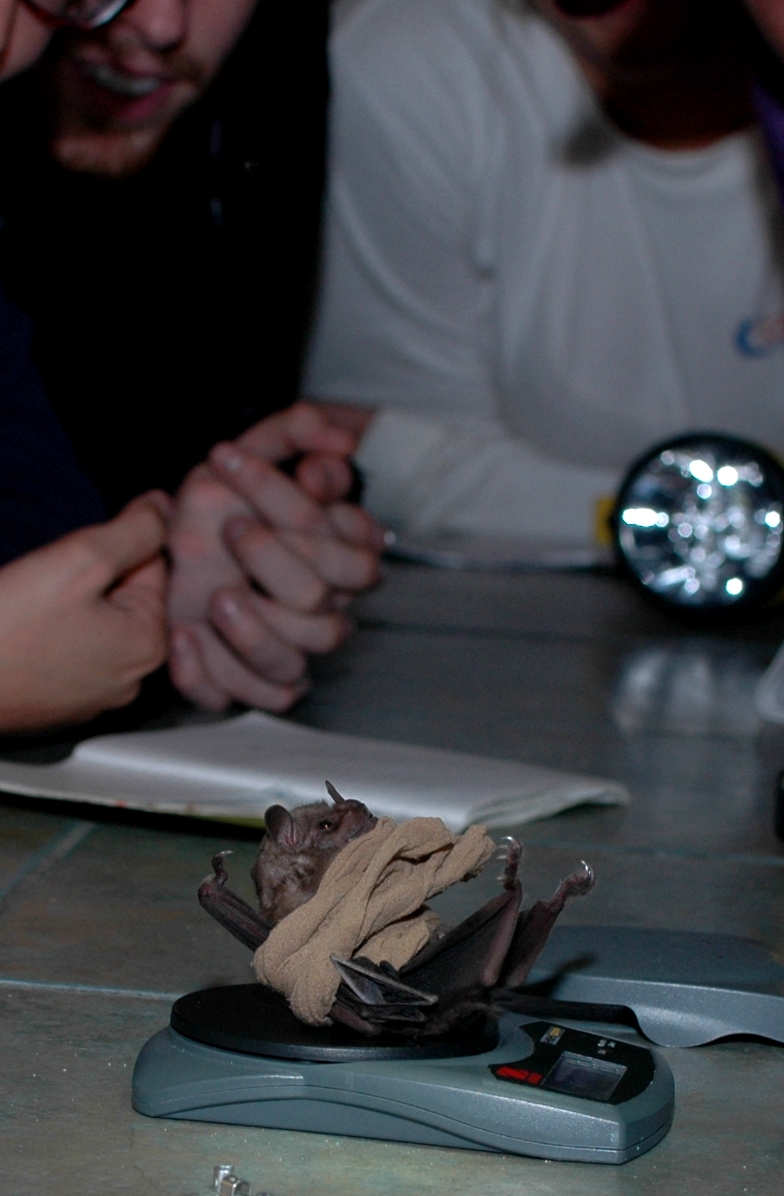Renata Platenberg reached deep into the pillow case that hung from her pants pocket, pulled out a furry-faced bat, and shared the often-misunderstood mammal’s charms with graduate students gathered Wednesday night at Magens Bay.
“Bats are better than pesticides,” said Platenberg, the V.I. Department of Planning and Natural Resources’ terrestrial biologist. She was there to swiftly catch, band, and release the bats that roost at Magens Bay.
Platenberg said she has monitored the resident bats there for three years. While this is not enough time for her to assess population trends, it is long enough for her to have learned how V.I. bats eat, sleep, and procreate.
Platenberg and her team generally do the job alone, but on Wednesday they invited a dozen graduate students from the University of the Virgin Islands’ Marine and Environmental Studies program to watch and learn.
The students met Platenberg at Shed 4 shortly after 6 p.m. Before they ventured into the woods, Platenberg warned them to stay clear of the nearly 10-feet-high by 25-feet-long nets. These fine mesh traps have already ensnared two cars, a Rottweiler, and countless bystanders, Platenberg said.
Once they trekked into the forest, Platenberg explained that five bat species call the Virgin Islands their year-round home. Three of these – Artibeus jamaicensis, the Jamaican Fruit-eating Bat; Stenoderma rufum, the Red Fig-eating Bat; and Brachyphylla cavernarum, the Antillean Cave Bat – eat primarily fruit, but also consume insects. A fourth, the Velvety Free-tailed Bat, or Molossus molossus, eats only insects, while the Greater Bulldog (or Fisherman) Bat, Noctilio leporinus, subsists on fish from the sea and gut.
Platenberg, who wore thick gloves to protect her hands in case the stressed bats bit, stressed that the territory’s bats, unlike some species on the mainland, do not carry any infectious diseases.
“They don’t have rabies,” Platenberg said. “They don’t have any infectious diseases that would affect other bats, or other animals, or people.”
In the Virgin Islands bats – not bees – are the number-one pollinator of commercial fruits. Bats are also among the very first animals to show up after hurricanes decimate the landscape, spreading seeds for much-needed new banana, papaya and guava trees. And those rude mosquitoes that feast on your flesh? There would be many more of them if bats were not around, said Platenberg.
Platenberg said she would know it was time to stop catching bats and move onto weighing, measuring, and banding them when the Antillean Cave Bat started appearing in the nets. These athletic bats do not roost at Magens; rather, they fly in to forage there from places such as Peterborg.
“They are really, really buff,” Platenberg said. “They are like the Vin Diesel of bats.”
Sadly, the VI Source did not get to see one of these hard-bodied bats, but we left with the same sense of wonderment as that voiced by photographer Angel Randall, who accompanied her graduate student boyfriend to the event.
“The coolest thing I learned is that bats can’t infect you with rabies,” Randall said. “I think that is a big fear – that you’ll get bit and get rabies.”
Along with students Pedro Nieves and Tyler Grespin, Randall reached out to pet the fuzzy head of a Jamaican Fruit-eating bat and got a close-up look at its little leaf nose.
“I can’t wait,” Randall added, “to call my family and tell them I did this.”







